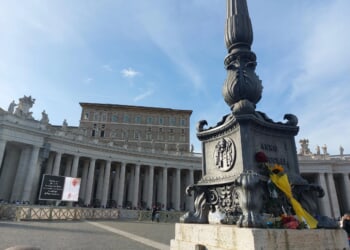It had been in the running for ‘Most Significant Overlooked Conflict Ever’. But we reach the two-year anniversary of Sudan’s devastating conflict on Tuesday, it seems the world is waking up.
David Lammy announced a foreign ministers’ summit in London, held jointly with France, Germany and the African Union (but not Sudan.) This comes just weeks after the Sudanese army momentously regained control of Khartoum earlier this month.
The last time Khartoum received so much global attention was possibly its fall to the Mahdi in 1884, and the death of General Gordon.
Sudan’s ‘forgotten civil war’ has, over the past two years, resulted in tens of thousands of deaths, a famine threatening millions, and an estimated 50,000 people ‘disappeared’ by one of the factions, the RSF, with evidence of torture and mass graves being discovered by the army as they pushed it out of Khartoum. This has barely made the headlines.
But as Britain holds conferences, without even inviting Sudan’s ambassador in London, other states are paying more active attention. Russia and Iran are capitalising on the West’s short attention-span and long-term disengagement.
Perhaps the UK and the West’s relative inactivity, in comparison to their energetic bid for influence, is because of post-colonial neurosis. Perhaps it is because Sudan falls between Middle East and Africa briefs. Or perhaps the whole situation just seems too difficult and too complicated.
And the history of Sudan is complicated. Since the country gained independence in 1956 it has been beset for decades by war, both between largely Arab and Muslim north and a largely Christian south and between army and government. The conflict tore the country asunder, but the eventual creation of South Sudan in 2011 only caused Sudanese warlords to draw breath.
Now, the war is between the army and a brutal militia – the newly re-branded Janjaweed, made famous by their ethnic cleansing of Darfur in 2004. They have changed their name from the Arabic, meaning “demons on horseback”, to something with a more administrative-ring: Rapid Support Forces, or RSF.
But they do not appear to have changed behaviour. Populations flee before them, with good reason; where the RSF have been pushed out, mass graves and evidence of torture are usually found.
The roots of this current conflict lie in the 2019 coup that toppled Omar al-Bashir, the dictator of 30 years (and the man accused of using the Janjaweed militia against the Darfuri people in 2003-5). Then in 2021 another coup by the army toppled the civilian government, headed by prime minister Abdalla Hamdok.
For the following two years, Sudan was run by a transitional military council headed by General Fattah al-Burhan. His deputy was Mohamed Hamdan Dagalo, alias “Hemedti”, a former Janjaweed commander and the leader of the RSF. The ambitious Hemedti allegedly became one of Sudan’s wealthiest men by seizing control of gold mines – with the Bashir government’s blessing – during the RSF’s military campaigns.
Both sides have faced international censure during the current war, but it is the RSF that has posed the greater threat to civilians, Sudan, and the wider region, and is the main cause of mass displacement.
Data from the UN suggests that where the RSF take control, civilians flee (many of them into Chad, recently visited by Foreign Secretary) and start to return when the RSF is routed by the army. The re-branded Janjaweed has again faced allegations of genocide, war crimes and mass rape.
At the very least, the humanitarian scale of the disaster demands our attention. It is estimated that 150,000 have died so far. A further 10.2 million have been displaced, both internally and to unstable areas in neighbouring Chad, Ethiopia, and South Sudan, overrunning existing refugee camps. Famine threatens 25 million people.
Now, with General Burhan is emerging victorious from his recent two-year siege of the capital, the full control of Khartoum could help the army complete its takeover of central Sudan, where it has triumphed over the RSF in recent months. It may also create the impetus needed for the army to threaten Hemedti in his Darfur stronghold and relieve the key city of El Fasher, which has been besieged by the RSF for nearly a year.
But as the West has dithered, with a policy of calling for a civilian government to somehow seize control through the sheer, shining force of democratic righteousness, Russia and Iran have been less romantic. Having shifted and hedged, they have ‘picked their winner’. They now support the army. Eyes on the prize, Iran has recently re-opened an embassy in Khartoum.
And the prize? The strategically vital Port Sudan. It lies on a vital maritime trade corridor and just across the Red Sea from Yemen where Iran’s proxies, the Houthis, are fighting their own battles, and Russia is already in discussions over a naval base.
For its part, the Sudanese army reportedly claims it wants to work far more closely with the West but, finding doors closed, takes any help it is offered.
The situation in Sudan poses a question that goes beyond our troubling ability to overlook cataclysmic humanitarian disaster if it’s too complicated: it goes right to the heart of how much the West wants to compete for our global future.
Will we persist in either ignoring dire situations or ‘calling for’ beautiful but fanciful solutions while our global rivals step in and take control of events? Or will we make hard, informed, choices, and engage – not only for our own immediate national interest, but for the survival of those very democratic ideals we rightly cherish?
Faced with complex theatres of ‘least-bad-options’, such as in Sudan, holding conferences (as welcome as this is) may seem safest for now. But if we cede practical global influence to our enemies, we should not be surprised if the cost is our future ability to protect democracy, human rights, and everything we dreamt of, ‘called for’, and held dear.


![NYC Tourist Helicopter Falls into Hudson River, Siemens Executive and Family Among Those Killed [WATCH]](https://www.right2024.com/wp-content/uploads/2025/04/NYC-Tourist-Helicopter-Falls-into-Hudson-River-Siemens-Executive-and-350x250.jpg)






![Green Day’s Cringe Trump Diss Ends in Fire and Evacuation [WATCH]](https://www.right2024.com/wp-content/uploads/2025/04/Green-Days-Cringe-Trump-Diss-Ends-in-Fire-and-Evacuation-350x250.jpg)
![Red Sox Fan Makes the ‘Catch of the Day’ with Unconventional ‘Glove’ [WATCH]](https://www.right2024.com/wp-content/uploads/2025/04/Red-Sox-Fan-Makes-the-‘Catch-of-the-Day-with-350x250.jpg)
![Bikini Clad Spring Breakers Prove Our Education System is Failing Students [WATCH]](https://www.right2024.com/wp-content/uploads/2025/03/Bikini-Clad-Spring-Breakers-Prove-Our-Education-System-is-Failing-350x250.jpg)





